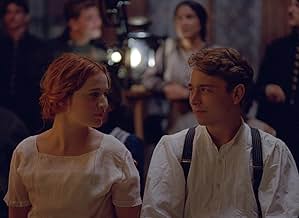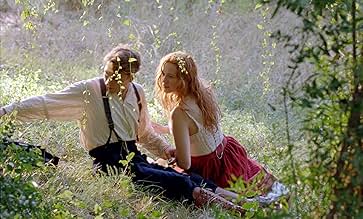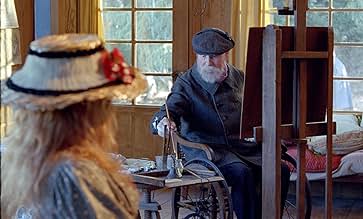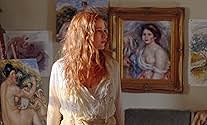CALIFICACIÓN DE IMDb
6.5/10
6.1 k
TU CALIFICACIÓN
En el verano de 1915, Jean Renoir, hijo del pintor impresionista Pierre-Auguste, vuelve a casa tras ser herido en la guerra. Andrée es la joven revivirá tanto al hijo como al padre.En el verano de 1915, Jean Renoir, hijo del pintor impresionista Pierre-Auguste, vuelve a casa tras ser herido en la guerra. Andrée es la joven revivirá tanto al hijo como al padre.En el verano de 1915, Jean Renoir, hijo del pintor impresionista Pierre-Auguste, vuelve a casa tras ser herido en la guerra. Andrée es la joven revivirá tanto al hijo como al padre.
- Dirección
- Guionistas
- Elenco
- Premios
- 3 premios ganados y 11 nominaciones en total
Anne-Lise Heimburger
- La boulangère
- (as Annelise Heimburger)
Thierry Hancisse
- Le brocanteur
- (as Thierry Hancisse de la Comédie Française)
Cécile de Moor
- Servante Collettes
- (as Cecile Rittweger)
Opiniones destacadas
Appropriately enough, about the world's most famous Impressionist painter.
While it's definitely not for those who strongly favor conventionally plotted drama or fast action, RENOIR consists of immediate realism and puts you right with the Renoir clan on the French Riviera. It's the sort of film that could easily have been made overly artsy and dull, but it's neither.
The entire story takes place in 1915, toward the end of Renoir's life. The relationship between model Andrée Heuschling and son Jean Renoir is, in many ways, more the subject of the story than the painter himself, yet Renoir himself is indispensable as "the boss," a sort of god-like backdrop to the entire cast and story. Having said that, I must add that there is a fair amount on Renoir's artistic processes, and his philosophizing can be applied to all sorts of art-forms as well as painting. One of RENOIR's strongest aspects is its portrayal of a man who is obsessed with his work and has one thing which utterly engulfs and consumes him.
Like many French films, RENOIR succeeds in breaking all sorts of rules. Among them:
--The plot is meandering and somewhat slice-of-life but still gripping;
--Andrée, the "girl from nowhere," and free but neglected youngest son Coco are characters that beg to be developed further, but at the same time, perhaps it's better that they remain mysterious;
--Lots of female nudity without it seeming the least bit gratuitous: After all, the subject is an artist who often painted naked girls;
--The mood is a successful mesh of somberness, poignancy, and (often laugh-out-loud) humor.
Just about every artsy cliché could be applied to this film, but suffice it to say that it is a beautiful experience. Even simple colors come alive here for the audience as they did for Renoir himself. I'm a word person who's never been a big painting aficionado, but this film made me see the visual arts in a whole new light and may even have converted me to some extent. The soundtrack--quiet, unobtrusive piano scores in the background--also does a great deal to carry this film.
While it's definitely not for those who strongly favor conventionally plotted drama or fast action, RENOIR consists of immediate realism and puts you right with the Renoir clan on the French Riviera. It's the sort of film that could easily have been made overly artsy and dull, but it's neither.
The entire story takes place in 1915, toward the end of Renoir's life. The relationship between model Andrée Heuschling and son Jean Renoir is, in many ways, more the subject of the story than the painter himself, yet Renoir himself is indispensable as "the boss," a sort of god-like backdrop to the entire cast and story. Having said that, I must add that there is a fair amount on Renoir's artistic processes, and his philosophizing can be applied to all sorts of art-forms as well as painting. One of RENOIR's strongest aspects is its portrayal of a man who is obsessed with his work and has one thing which utterly engulfs and consumes him.
Like many French films, RENOIR succeeds in breaking all sorts of rules. Among them:
--The plot is meandering and somewhat slice-of-life but still gripping;
--Andrée, the "girl from nowhere," and free but neglected youngest son Coco are characters that beg to be developed further, but at the same time, perhaps it's better that they remain mysterious;
--Lots of female nudity without it seeming the least bit gratuitous: After all, the subject is an artist who often painted naked girls;
--The mood is a successful mesh of somberness, poignancy, and (often laugh-out-loud) humor.
Just about every artsy cliché could be applied to this film, but suffice it to say that it is a beautiful experience. Even simple colors come alive here for the audience as they did for Renoir himself. I'm a word person who's never been a big painting aficionado, but this film made me see the visual arts in a whole new light and may even have converted me to some extent. The soundtrack--quiet, unobtrusive piano scores in the background--also does a great deal to carry this film.
Greetings again from the darkness. Admittedly, I expect more from independent films since there is usually no committee of producers sucking the life out of the filmmaker's vision. While writer/director Gilles Bourdos teams with Cinematographer Ping Bin Lee to deliver a film that carries the visual beauty of its subject's paintings, it somehow offers little else.
Veteran French actor Michel Bouquet captures the essence of a 74 year old Pierre-Auguste Renoir, a master Impressionistic artist. By this time (1915), Renoir is in constant pain and continues painting despite his gnarled hands courtesy of severe arthritis. He has relocated to Cote D'Azur (the French Riviera) to leave in peace with nature and the warmer weather. His estate is gorgeous and provides the backdrops for many paintings. We meet his newest model, 15 year old Andree Heuschling (Christa Theret). Her spirit inspires not just Renoir the artist, but also his son Jean (Vincent Ruttiers), sent home to recover from his WWI injuries.
Both father and son seem to objectify the beautiful and spirited Andree, neither being capable of an adult and equal personal relationship. The frustration with this movie stems from its unwillingness to offer anything other than observations of its characters. It meanders through days with no real purpose or insight. This despite having subjects that include one of the greatest artists of all-time and his son, who went on to become a world famous movie director. The story, if there is one, just kind of lays there flat, surrounded by beautiful colors and textures.
Auguste Renoir died in 1919, but earlier that year managed to visit the Louvre and view his own paintings hanging in the majestic halls. Jean Renoir married Andree and cast her in his first silent films (as Catherine Hessling). When the films flopped, they divorced. She went on to a life of obscure poverty, and he directed two of the greatest films in history: Grand Illusion and The Rules of the Game.
Alexandre Desplat provides another fine score, leaving us lacking only a story or point to the film. To learn much about Pierre-Auguste Renoir, it is recommended to read the biography his son Jean wrote.
Veteran French actor Michel Bouquet captures the essence of a 74 year old Pierre-Auguste Renoir, a master Impressionistic artist. By this time (1915), Renoir is in constant pain and continues painting despite his gnarled hands courtesy of severe arthritis. He has relocated to Cote D'Azur (the French Riviera) to leave in peace with nature and the warmer weather. His estate is gorgeous and provides the backdrops for many paintings. We meet his newest model, 15 year old Andree Heuschling (Christa Theret). Her spirit inspires not just Renoir the artist, but also his son Jean (Vincent Ruttiers), sent home to recover from his WWI injuries.
Both father and son seem to objectify the beautiful and spirited Andree, neither being capable of an adult and equal personal relationship. The frustration with this movie stems from its unwillingness to offer anything other than observations of its characters. It meanders through days with no real purpose or insight. This despite having subjects that include one of the greatest artists of all-time and his son, who went on to become a world famous movie director. The story, if there is one, just kind of lays there flat, surrounded by beautiful colors and textures.
Auguste Renoir died in 1919, but earlier that year managed to visit the Louvre and view his own paintings hanging in the majestic halls. Jean Renoir married Andree and cast her in his first silent films (as Catherine Hessling). When the films flopped, they divorced. She went on to a life of obscure poverty, and he directed two of the greatest films in history: Grand Illusion and The Rules of the Game.
Alexandre Desplat provides another fine score, leaving us lacking only a story or point to the film. To learn much about Pierre-Auguste Renoir, it is recommended to read the biography his son Jean wrote.
Normally I love French films, especially those set in the beautiful countryside, and I did enjoy the cinematography in this film, but.....something was really lacking for me. Other reviewers have said the same - an unfortunate lack of drama or excitement, in a plodding but beautiful film. Not much development of the characters - we are left wondering about the various females in the household and their feelings. The wounded son displays a curiously restrained demeanor in the film, not saying a whole lot, and the younger son is portrayed as somewhat odd and neglected, but I did not read anything about his neglect in other biographies of Renoir, and his strange behavior seemed to have no point in the film. I found it hard to sit through the whole film, constantly expecting something to happen. One moment of strong emotion by Andree did not lead to anything much afterward. The constant focus on Renoir's horribly disfigured hands was probably essential but disturbing. I would have liked some scenes with flashbacks to his youth and success as a painter, to give this film some more life. At the time I really felt that I did not like the film, but I keep thinking back on the scenes, so it was worth seeing.
Renoir was a surprise for me in that it covered in some depth aspects of the life of both Renoir the painter and his son Jean, the filmmaker. This beautifully shot film, set in the south of France, will surely appeal to anyone interested in either Renoir--or both.
One idea which popped into my head while watching this was that Renoir the painter was something of a womanizer, in that he ended up having affairs with his models. This makes me wonder what the #METOO crowd would say about that. Or maybe it´s okay when someone has been dead for a century? My own view is that works of art should not be shunned on the basis of moral judgment of their creators. I was shocked, for example, when Hachette recently refused to publish Woody Allen´s memoir. Would they also advocate for destroying his brilliant films?
Anyway, I recommend this film. It is slow, but intentionally so.
One idea which popped into my head while watching this was that Renoir the painter was something of a womanizer, in that he ended up having affairs with his models. This makes me wonder what the #METOO crowd would say about that. Or maybe it´s okay when someone has been dead for a century? My own view is that works of art should not be shunned on the basis of moral judgment of their creators. I was shocked, for example, when Hachette recently refused to publish Woody Allen´s memoir. Would they also advocate for destroying his brilliant films?
Anyway, I recommend this film. It is slow, but intentionally so.
This is without question one of the most beautiful movies I have ever seen. The photography, especially the scenes outdoors, looks like one early Renoir painting after the next. The colors are vivid and lush, and the greens are varied to the nth degree. You could watch this movie with the sound turned off and still have a great time.
Which is not to say that the script and acting are not worth paying attention to. The story is nothing special: During the last years of his life, during World War I, Renoir lived in the South of France, to avoid the German invaders. There he paints a beautiful young woman, whom we get to see in the altogether rather often, to pleasing effect. (The movie never explores the extent to which this has an erotic aspect for Renoir, but since it is made clear that he ended up sleeping with his previous models, we can assume that. He is not just painting rose and pink. He keeps emphasizing that he is painting flesh.) His middle son, Jean (who will be the famous French film director down the road), comes home from the war on sick leave and eventually falls in love with the new model. That doesn't go particularly well, as she doesn't seem very committed to monogamy with him.
The youngest son, Claude (named after Monet), doesn't deal well with his Mother's recent death, or his distant relationship with Renoir. That doesn't get explored very deeply either.
So, in effect, the story threads are handled very Impressionistically as well: little touches of them here and there, but no detailed analysis.
The music is often very beautiful, so don't turn off the sound.
Don't expect great drama here. The acting is all fine, but there are no in-depth character portraits here - as there are not in Renoir's paintings - and no real drama. It is all very impressionistic, and often in a very beautiful way.
See this in a theater if you can. I suspect it will lose a lot reduced to even a 64" TV screen.
------------------------------
I just saw it for a second time, this time on my 46" TV screen. Yes, it does lose a lot, but the color and light are still beautiful. It's a must see movie, but as I wrote before, don't expect much in the way of drama.
Which is not to say that the script and acting are not worth paying attention to. The story is nothing special: During the last years of his life, during World War I, Renoir lived in the South of France, to avoid the German invaders. There he paints a beautiful young woman, whom we get to see in the altogether rather often, to pleasing effect. (The movie never explores the extent to which this has an erotic aspect for Renoir, but since it is made clear that he ended up sleeping with his previous models, we can assume that. He is not just painting rose and pink. He keeps emphasizing that he is painting flesh.) His middle son, Jean (who will be the famous French film director down the road), comes home from the war on sick leave and eventually falls in love with the new model. That doesn't go particularly well, as she doesn't seem very committed to monogamy with him.
The youngest son, Claude (named after Monet), doesn't deal well with his Mother's recent death, or his distant relationship with Renoir. That doesn't get explored very deeply either.
So, in effect, the story threads are handled very Impressionistically as well: little touches of them here and there, but no detailed analysis.
The music is often very beautiful, so don't turn off the sound.
Don't expect great drama here. The acting is all fine, but there are no in-depth character portraits here - as there are not in Renoir's paintings - and no real drama. It is all very impressionistic, and often in a very beautiful way.
See this in a theater if you can. I suspect it will lose a lot reduced to even a 64" TV screen.
------------------------------
I just saw it for a second time, this time on my 46" TV screen. Yes, it does lose a lot, but the color and light are still beautiful. It's a must see movie, but as I wrote before, don't expect much in the way of drama.
¿Sabías que…?
- TriviaOfficial submission of France to the Oscars 2014 best foreign language film category.
- ErroresWhen Pierre-Auguste walks in on Jean Renoir being bathed, a modern toggle-style light switch is visible on the wall. The toggle switch wasn't invented until 1917, which is a few years after that part of the film. Earlier light switches were push-button style, and the switch on the wall is also of a modern plastic style that is very much later.
- Citas
Pierre-Auguste Renoir: You're rather modest for an actress.
Andrée Heuschling: Actress doesn't mean whore.
- ConexionesFeatured in Fandor: Cannes You Dig It? | Fandor Spotlight (2022)
- Bandas sonorasShimmy Dédée
By Patrick Artero
Performed by Patrick Artero, Philippe Baudouin, Francis Guero, André Neufert and Michel Queraud
Selecciones populares
Inicia sesión para calificar y agrega a la lista de videos para obtener recomendaciones personalizadas
- How long is Renoir?Con tecnología de Alexa
Detalles
- Fecha de lanzamiento
- País de origen
- Sitio oficial
- Idiomas
- También se conoce como
- 印象雷諾瓦
- Locaciones de filmación
- Productoras
- Ver más créditos de la compañía en IMDbPro
Taquilla
- Total en EE. UU. y Canadá
- USD 2,293,798
- Fin de semana de estreno en EE. UU. y Canadá
- USD 65,194
- 31 mar 2013
- Total a nivel mundial
- USD 7,816,573
- Tiempo de ejecución1 hora 51 minutos
- Color
- Mezcla de sonido
- Relación de aspecto
- 1.85 : 1
Contribuir a esta página
Sugiere una edición o agrega el contenido que falta

































